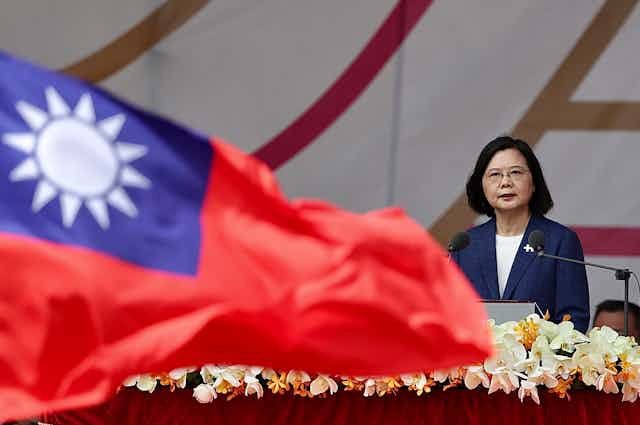In the past fortnight, record numbers of Chinese military aircraft have deliberately flown into Taiwan’s air defence zone, sparking alarm in Taiwan and concern across the region as well as for the United States and its allies. This intentional aggression has been accompanied with forthright statements from the Chinese president, Xi Jinping.
It is routine each year for the Chinese government to issue high-level statements on October 1 – its national day – that it regards Taiwan to be a renegade province of China and reserves the right to reunify it with the mainland, by force if necessary. But is exceptional for China to back this up with major fighter plane incursions into Taiwan’s Air Defence Identification Zone (ADIZ) – more than 110 such incursions in the first four days of October alone.
On October 6, Taiwan’s defence minister, Chiu Kuo-Cheng, stated that this military challenge from China was the toughest in 40 years. He added that that Chinese military capabilities were growing at a pace that could enable a full-scale invasion attempt by 2025 at a cost that the Chinese Communist Party might consider “bearable”. There have been many signals that Beijing is reconsidering its hitherto peaceful approach to the idea of unification with Taiwan in favour of the notion of unification by force.
The timing of recent actions and the signals that they are designed to send most likely relate to the “shift to the Pacific” adopted by the US in the aftermath of its abrupt withdrawal from Afghanistan. The creation of the Aukus (Australia-UK-US) alliance, with its commitment to help Australia acquire a fleet of nuclear-powered submarines to contribute to military capabilities in the region, would have prompted some kind of reaction from Beijing.
Uncertainty and risk
Recent events seem alarming – but the consensus among military experts is that China is not (yet) ready for a military campaign to occupy Taiwan. China could easily strike targets on the island with airstrikes and missiles, as the recent air incursions suggest. It could also use naval forces and cyberattacks to cut Taiwan off from the outside world.
But there remain two sources of uncertainty. The first is that China may not yet be ready to launch out an all-out amphibious assault on the island. Such an operation is likely to stretch China’s capabilities and result in substantial casualties on both sides.

The other uncertainty for China is the response of the US. While military planners in Beijing may feel that China’s forces have now some degree of local superiority, it is unclear to what level the US would be willing to escalate a conflict if it comes to Taiwan’s aid. And any Chinese military intervention to force Taiwan’s unification with the mainland poses potentially catastrophic risks to China’s wider economic and foreign policy objectives.
View from Beijing
So why do leaders of the Chinese Communist Party (CCP) persist in threatening Taiwan and refuse to accept any discussion of Taiwanese independence? The answer is not that Taiwan realistically poses any external security threat to China. It is rather that the party has chosen to make reunification with Taiwan a symbol of the strength and legitimacy of CPP rule.
It is unlikely that any Chinese president would politically survive a successful declaration of independence by Taiwan. Under Xi’s much more assertive foreign and security policy since 2014, China’s capacity to assert influence and impose controls on what it declares to be “internal” issues has become even more significant in internal Chinese politics.

At the same time the Chinese leadership seems to be determined to signal resolve against a greater engagement by the US in the region, something seen in Beijing as being based on hostility towards China. So the risks of confrontation and an escalation of armed conflict in the Taiwan Straits are a major concern.
Strategic ambiguity
Since the establishment of diplomatic relations between USA and mainland China in 1972, the USA has maintained a policy of strategic ambiguity on this issue. It has tried to strike a delicate balance between deterring a Chinese attack on Taiwan and avoiding any promises to Taiwan that might give a Taiwanese government the confidence to formally declare independence.
This balance now appears to be shifting. The recent US official acknowledgement that there are American trainers in Taiwan working with the Taiwanese military is a significant indicator. But the actual extent of US commitments to the defence of Taiwan remains ambiguous.
It is still highly unlikely that major war is imminent. The greatest risk appears to arise from an inadequately controlled escalation of a military incident. As Taiwanese air defences scramble to respond to continued Chinese naval and fighter aircraft incursions, there are risks of unintended incidents.
Xi is unlikely to accept the shooting down of a Chinese fighter aircraft, for example, without ordering some kind of military retaliation. There has been inadequate investment to develop communication and diplomatic arrangements for crisis management in the Taiwan Straits between China, Taiwan and the USA. This is partly because China does not want its adversaries to be able to predict with any confidence what might happen.
Against this atmosphere of uncertainty and ambiguity, it must be hoped that Xi and the leadership of the CCP are satisfied they have made their point and scale down the incursions into Taiwan’s ADIZ soon.

